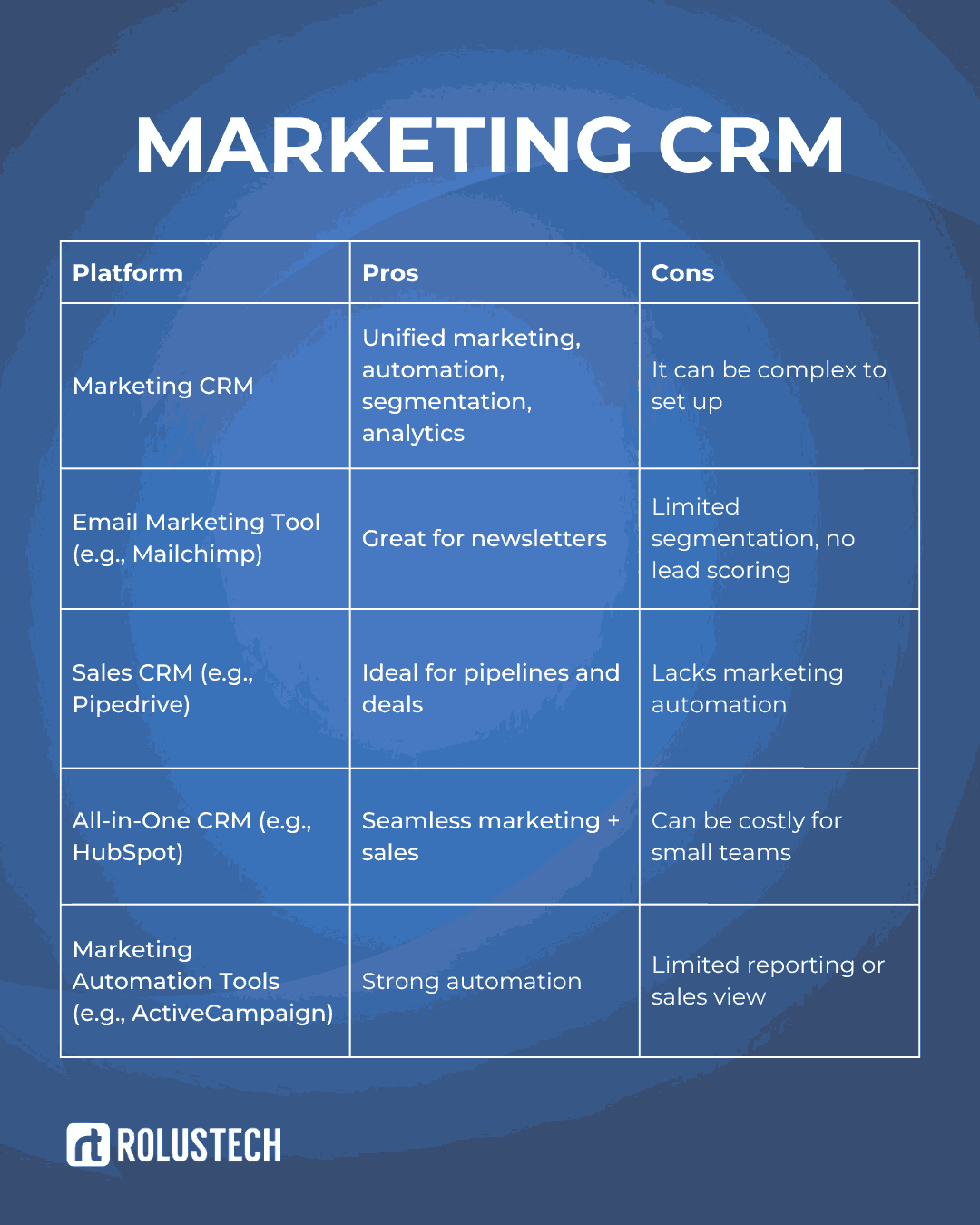A correctly implemented marketing crm can help turn leads into loyal customers.
In 2025, businesses will rely more than ever on CRM platforms tailored for marketing. These tools do more than store contacts, they automate campaigns, track customer journeys, and help teams stay connected.
This guide explores the best CRM marketing platforms, their benefits, how they work, and how to choose the right one for your needs.
What is a Marketing CRM?
A marketing CRM (Customer Relationship Management system) is software built to manage customer relationships with a marketing focus.
It allows businesses to segment audiences, automate campaigns, and deliver personalized experiences at scale.
Unlike standard CRMs, which prioritize sales pipelines, marketing CRMs are designed for campaign execution, analytics, and lead engagement.
With integrated tools such as email marketing, social media automation, and customer segmentation, they offer comprehensive visibility across the whole funnel, from initial interaction to final sale.
Marketing CRMs are essential for:
- Managing multi-channel campaigns
- Automating follow-ups
- Tracking marketing ROI
- Personalizing customer journeys

Key Features and Benefits
The best marketing CRMs in 2025 share these essential features:
1. Marketing Automation
Automate emails, SMS, push notifications, and workflows to nurture leads automatically based on behavior or triggers.
2. Customer Segmentation
Divide your audience based on geography, behavior, source, or engagement to improve targeting.
3. Personalization
Deliver tailored messages, offers, and experiences to each lead or customer.
4. Email Campaign Management
Design, schedule, and track email campaigns with A/B testing, click tracking, and detailed analytics.
5. Analytics and Dashboards
Monitor lead behavior, campaign performance, conversion rates, and ROI.
6. Lead Scoring
Prioritize leads based on engagement and likelihood to convert.
7. Integrations
Seamlessly connect with landing page builders, ecommerce platforms, social channels, and CRMs.
8. Multi-Channel Campaigns
Manage email, SMS, social, and ad campaigns from a single dashboard.
Benefits Include:
- Higher conversion rates
- Reduced customer acquisition costs
- Better alignment between sales and marketing
- Improved customer retention
- Greater productivity with fewer manual tasks
How It Works / Use Cases
A marketing CRM collects and uses customer data to deliver personalized, automated communication.
Here are real-world use cases across different industries:
E-commerce:
- Trigger emails when a cart is abandoned
- Recommend products based on browsing history
- Automate loyalty campaigns for repeat buyers
SaaS:
- Welcome series for new sign-ups
- Lead nurturing based on trial usage
- Win-back campaigns for inactive users
B2B:
- Nurture cold leads with educational content
- Score leads and notify sales of high-interest prospects
- Automate webinar or demo invites
Healthcare:
- Send appointment reminders
- Automate patient onboarding
- Follow-up health tips or services
Education:
- Track student inquiries
- Send course recommendations
- Run automated event campaigns
Marketing CRMs simplify campaign execution, ensuring the right message reaches the right person at the right time.
Marketing CRM vs Alternatives
How does a marketing CRM compare to other tools?

Cost and ROI Considerations
Here’s what you need to know about pricing and ROI for marketing CRMs in 2025:
Pricing:
- Small Business: $15–$99/month (MailerLite, Zoho, Brevo)
- Mid-Market: $99–$300/month (ActiveCampaign, Keap, SharpSpring)
- Enterprise: $400+/month (Salesforce Marketing Cloud, HubSpot Marketing Hub)
Cost Factors:
- Number of contacts
- Number of users
- Features needed (automation, integrations, analytics)
- Support and onboarding services
Calculating ROI:
- Increase in qualified leads
- Higher conversion rate
- Lower customer acquisition cost (CAC)
- Improved customer lifetime value (CLTV)
For example, if your CRM costs $150/month but generates $2,000 in additional revenue, the ROI is massive.
Most companies break even within 3–6 months when the platform is set up and used correctly.
Common Mistakes or Misconceptions
Businesses often make the following mistakes with marketing CRMs:
- Overbuying features they don’t use
- Poor onboarding, leading to low adoption
- Neglecting CRM hygiene, such as cleaning lists
- Using CRMs only for emails, ignoring automation
- Failing to align marketing with sales workflows
- Not reviewing performance data regularly
- Expecting instant results without a strategy
A marketing CRM is a tool that requires a well-planned approach, high-quality content, and effective targeting.
Final Thoughts
In 2025, having a marketing CRM is essential for growing your business.
It helps teams automate, personalize, and analyze campaigns across multiple channels. With the right platform, you can build deeper customer relationships, reduce marketing costs, and drive more sales.
Whether you run a startup or a global brand, a good marketing CRM is a wise investment.
Looking to upgrade your marketing with the best CRM tools?
Let Rolustech help you find the perfect fit, tailor it to your needs, and make your marketing smarter. Contact us today for a free consultation and personalized demo.
FAQs
Q1: What makes a CRM a “marketing CRM”?
A marketing CRM includes tools for automating, personalizing, and analyzing marketing campaigns. It’s designed for marketers, not just sales teams.
Q2: Can small businesses use marketing CRMs?
Yes. Many tools, such as Zoho, MailerLite, and Brevo, are affordable, simple to use, and designed for small teams.
Q3: What are the best marketing CRM platforms in 2025?
Top tools include:
HubSpot Marketing Hub
Zoho CRM Plus
ActiveCampaign
Salesforce Marketing Cloud
Keap (formerly Infusionsoft)
Brevo
SharpSpring
Q4: How do I choose the right CRM for marketing?
Start by:
Listing must-have features
Setting your budget
Considering scalability
Checking integration options
Testing free trials or demos
Q5: How long does it take to see results from a marketing CRM?
Typically, 1 to 3 months. It depends on your setup, list quality, and campaign execution.
Q6: Can a CRM replace my email marketing tool?
Yes. Most marketing CRMs include advanced email tools and more.
Q7: Can Rolustech help with marketing CRM implementation?
Absolutely! Rolustech offers end-to-end services for CRM selection, setup, integration, and custom development.




